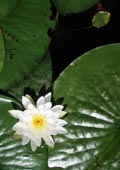BWCA
-
September 2013
Page
2: Days 1-4
Moose River to Tiger Bay Area
Day 1 – Thursday, Sept. 12 – Play
Hurt or Don't Play At All
Phase 2 of the portal has me following the Voyageur North
shuttle van to the Little Indian Sioux access, which is my intended take-out
point.
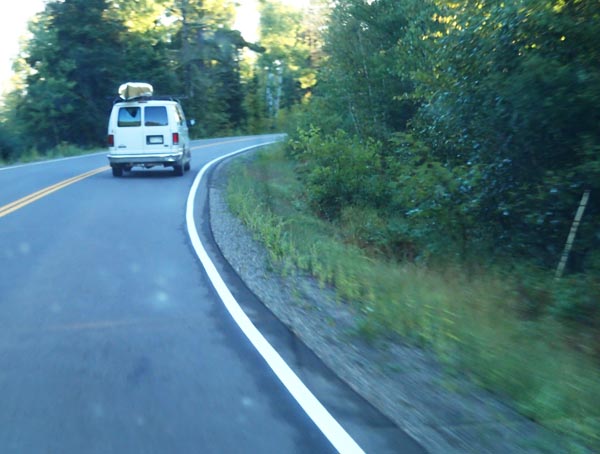
The Moose River North entry point is pretty much as I'd
left it three years ago, except I have a different boat this time.
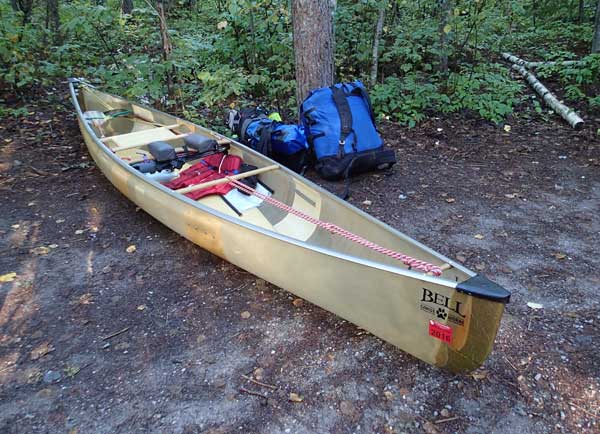
The 160-rod portage is done in 50 minutes, which is just
about no time for a portage of this length. I'd planned to triple-carry,
but the packs and boat weights work out so I can do it in two trips. It
helps that this portage trail is wide, smooth, and downhill to the river.
I must be pretty excited to be heading out because I
forget how to lift. Reaching down to put my main pack into the boat
I forget to set my lower back and wrench it pretty badly. I briefly
consider the foolishness of playing hurt, but I quickly realize that
I have only two options: play hurt or don't play at all. From
then on I remember to use proper technique, but it still bothers me
the rest of the trip, and for several weeks afterwards.
The river leaves a pattern of foam at the end of the
first portage that gets my attention.
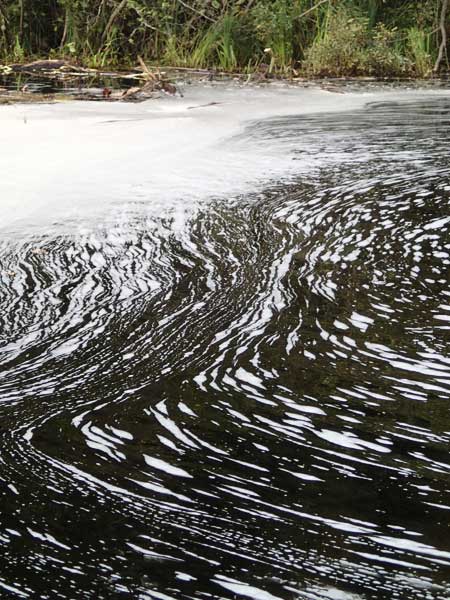
A few minutes later - what's this, a sandbar? in the
Moose River? My first thought is that it was caused by a down
tree that created a small dam, but it sure must have been a lot of
water. I learn later that the culprit was a beaver dam
that burst on an upstream tributary a month earlier, draining a pond,
flooding the river, and taking out a few more beaver dams downstream.
It's a short carry.
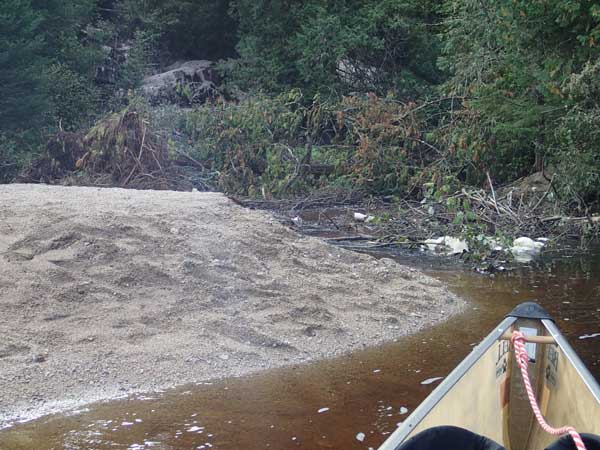
The fast current at the exit shows how much water is
flowing in this otherwise placid stream.
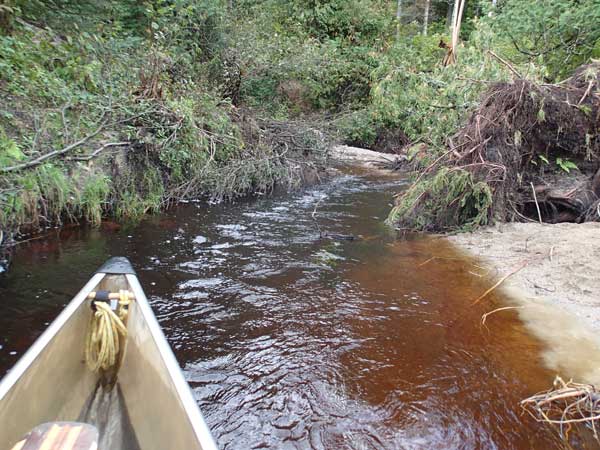
And here's an aerial view of what caused it.
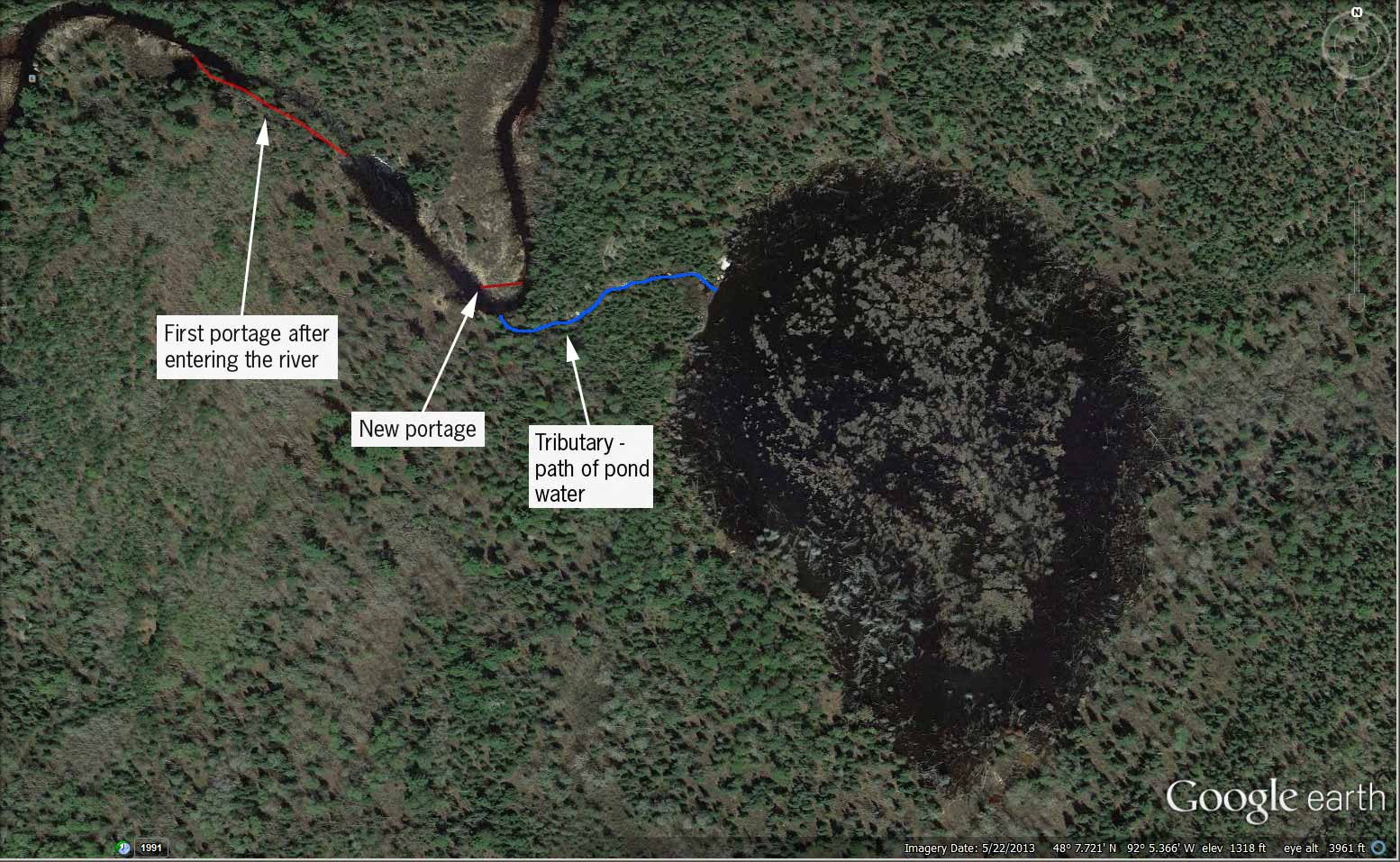
Up ahead is a 25-rod portage that bypasses what looks
like a clear stretch of river. I see a few rocks in the distance but it
looks like they're navigable. They are, but not without a few bumps and
scrapes.
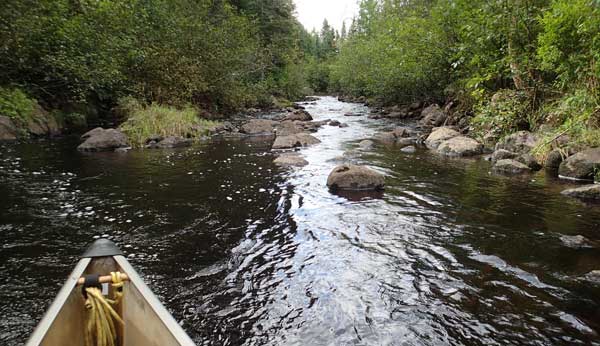
So far I've been billed for one additional portage and
gotten a one-portage discount. That seems fair.
The Moose River is tight and twisty in some places and
wide and open in others. The NorthStar handles the twisties nicely,
thanks to having a bit of rocker, and it tracks well too, especially
when leaned a bit. On the river there are beaver dams in some of the
narrower places, some of them intact and others with big gaps. Only
two require getting out of the boat to pull it over.
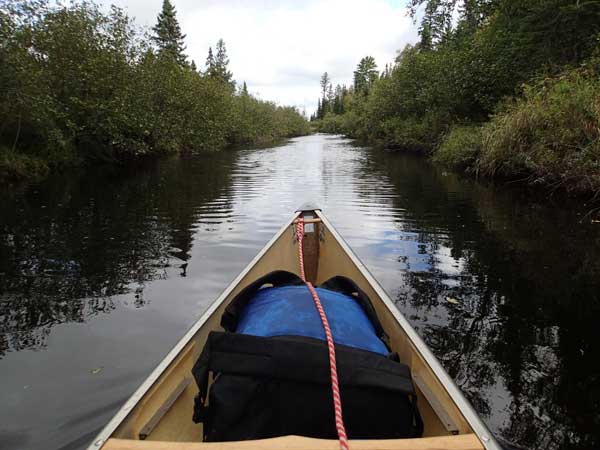
The day is partly cloudy and cool enough to be comfortable
without a jacket. But there's enough of a headwind that I decide to
leave the mostly-wide-open Nina-Moose River and Lake Agnes for tomorrow
morning when it's (hopefully) calmer. I land at campsite no. 17 (C1789)
on Nina-Moose Lake. It's a nice site and would be OK for a layover
day, but it wouldn't rate 5 stars. There's a nice rock table, one flat
tent pad, and no good tarping options.
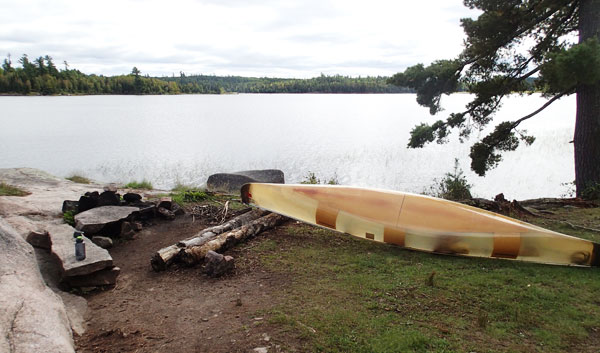
Some sort of water bug, and lots of them:
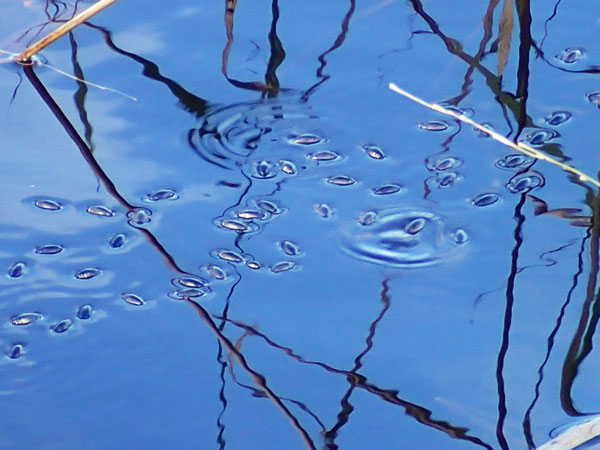
The view isn't bad, especially with the sun in the trees:
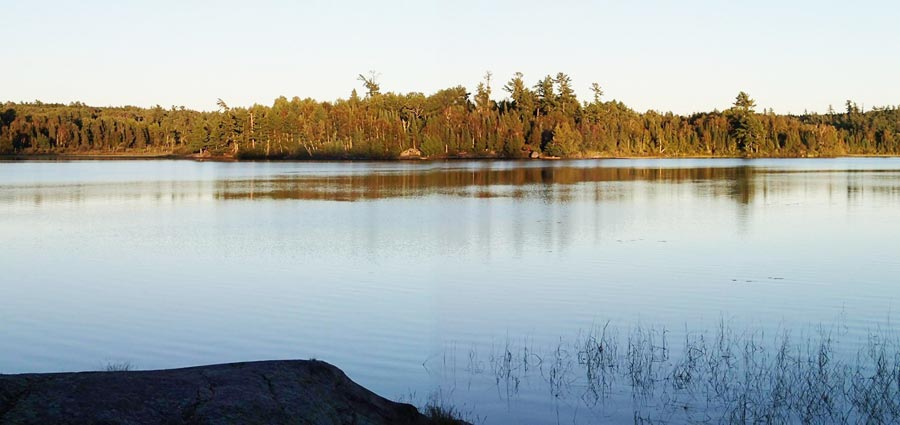
I don't hang my food pack because stashing it out of
the way works just fine. See if you can spot it.
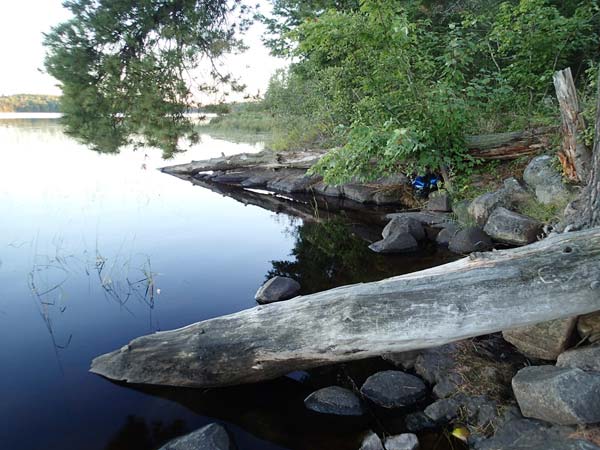
It's a clear night and the nearly-full moon is in perfect
position.
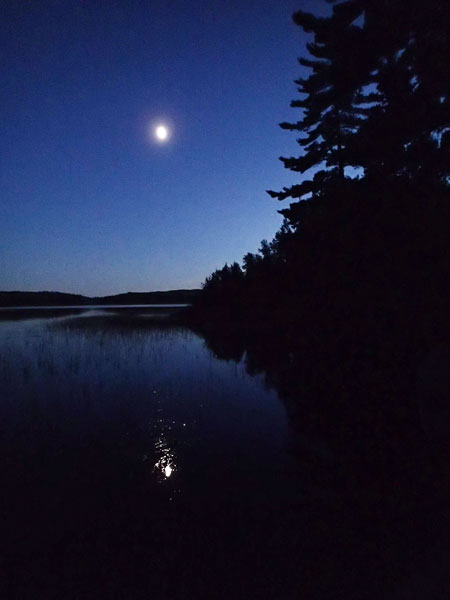
There's a freeze warning for tonight. I brought the lightweight
40-degree bag in addition to the 25-degree Kelty Coromell, but it stays
fairly warm - 45 degrees - in the tent. Better to sleep warm than shiver
all night. Some time during the really dark hours I hear a couple of huge
splashes that sound like someone throwing big rocks into the lake. Big
fish, no doubt.
There is so, so much to be grateful for:
- My ability to do this. Some people (especially those with chronic
diseases) can't imagine tripping, or even riding a bike.
- My health.
- A strong heart (in both senses of the word).
- My mind: to be able to sustain solitude and a mildly self-deprecating
sense of humor; to be mindful, at least some of the time.
- The ability to enjoy and appreciate nature, both esthetics and
a sense of oneness.
- Friendships of all kinds.
- The ability to love and receive love.
- The prospect of a warm and sustainable relationship.
- The list goes on ....
Day 1 summary:
Total distance 4 miles in 2:47
4 portages of 195 rods in 1:22
Day 2 – Friday, Sept. 13 – Tiger Bay
or Bust
This morning I'm awake at 6:00, but as usual it takes
a little while to get fully conscious. When I finally crawl
out of the tent I find a beautiful mist and a Photoshop sky.
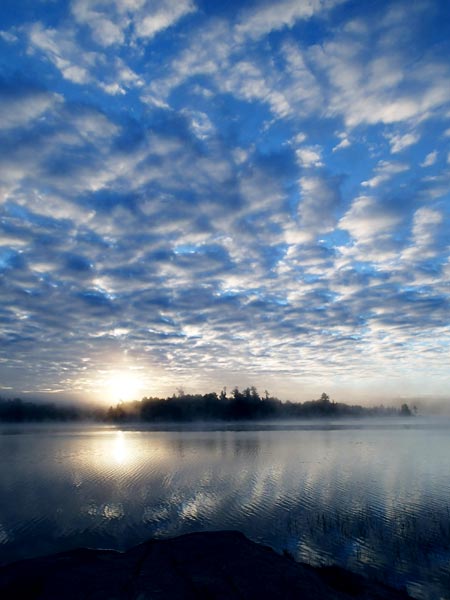
I finally get on the water
at 9:00. So much for trying to expedite things.
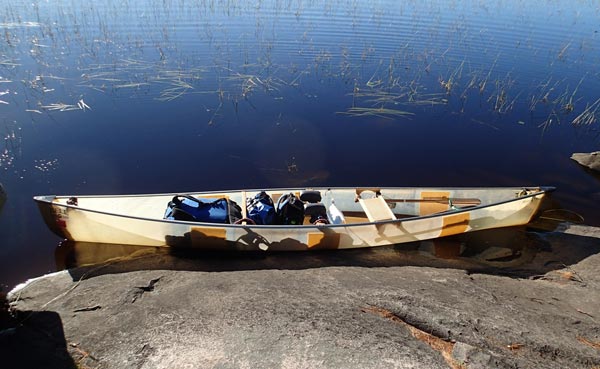
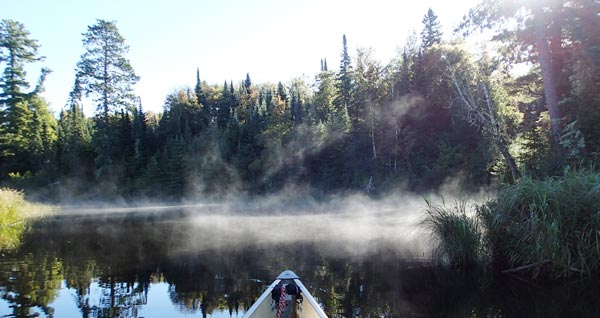
It's a good day today but tiring. It's mostly sunny,
in the mid-60s, and with a moderate oblique tailwind. The NorthStar
handles well in light to moderate wind but it's still pretty responsive
- more so than the Wenonah Prism, less than the Mad River Independence.
I experiment with shifting packs around and hit on a way to neutralize
the trim so I can paddle on either side. This makes for more
enjoyable traveling than I've had on the last couple of trips.
There's a photogenic little otter slide on the 70-rod
portage on the Nina-Moose River. Seems I have to take a picture every
time I see it. It seems to beg for another installment of "Boundary
Waters: Why We Portage."
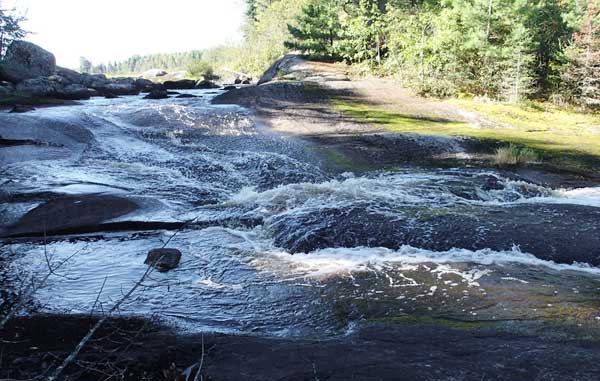
The next portage landing is almost nice enough to keep
my feet dry. Along the trail there's an opportunity for another installment
of "Boundary
Waters: Why We Portage."
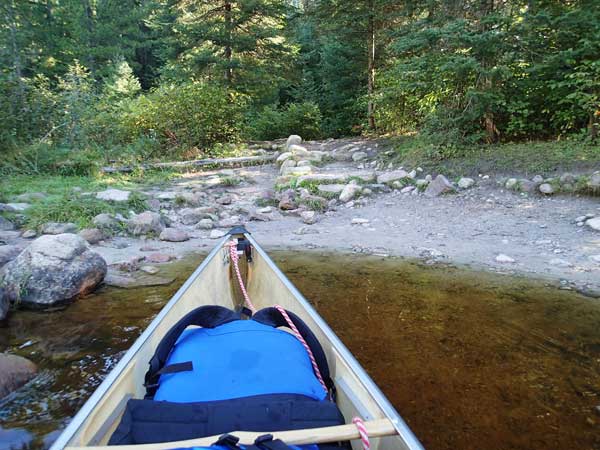
At length, the Nina-Moose River dumps into Lake Agnes,
and I'm glad for the NorthStar's adaptability. It's a fairly short
jaunt to the 26-rod portage leading to the Boulder River, one of my
favorite places in the Boundary Waters. There's a spot where the river
slides over a smooth rock with a possible chute on each side. After
backferrying left and right a few times I choose the right side (left
side of the picture), where I discover a flat rock, submerged just
enough to brush the boat lightly as it glides over. After a few little
whitewater moves in the eddies on both sides of the chute, I continue
downstream.
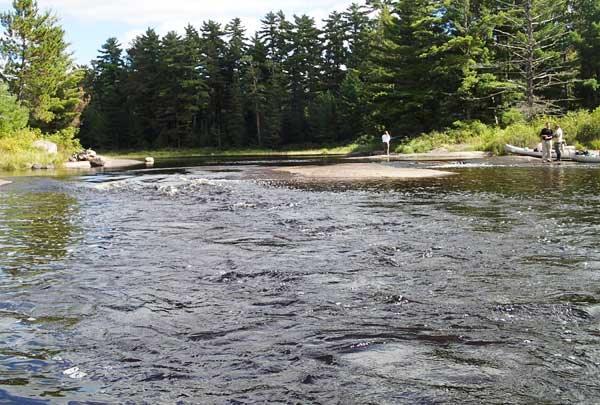
I suppose there's a reason the Boulder River got its
name.
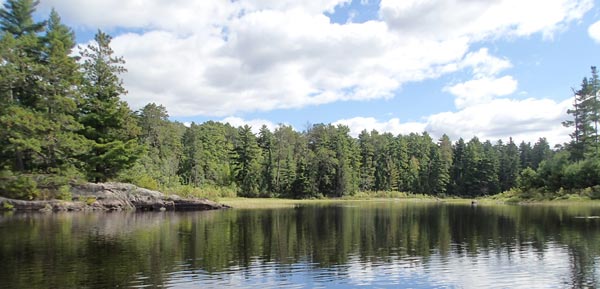
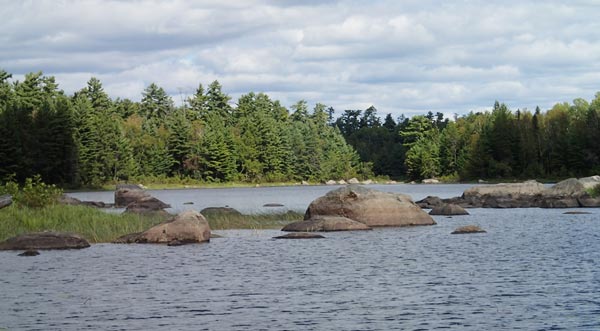
Site no. 292 (C0178) in Tiger Bay is supposed to be a
5-star campsite. I stop to check it out but leave in short order. It's
big and open with lots of tarping options and two good tent pads right
next to each other. It also appears heavily used and I opt for a true
5-star site, no. 359 (C0175). There's a description of this site toward
the bottom of this
page of my trip report of June, 2010.
Growing out of the rock I find a few Pale Corydalis.
Their delicacy is quite a contrast to the rugged conditions they grow
in.
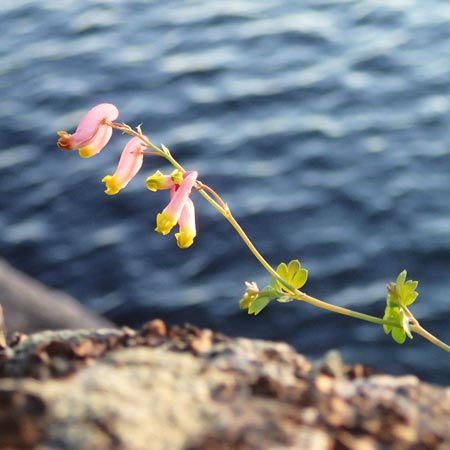
The boat has me baffled. I've noticed a little more water
in it than I'd expect, but I've passed it off as coming from paddles,
or from my boots draining. But I've never had to sponge a boat out
regularly under normal use, and I conclude it's leaking. I'm not
sure the lightweight layup is strong enough to reliably support me,
since the hull has no reinforcement at the center seat position.
The sides bow outward about 1/8" on each side, and I wonder if there's
some kind of structural problem causing leakage. I decide that when
I leave this campsite I'll launch it dry and then see if it stays dry.
Now that I have a plan for how to approach the leak,
I go to bed with the comfort of having solved one of the biggest problems
of my life.
It's warm tonight, 45-50 degrees.
Day 2 summary:
Total distance 12 miles in 5:00
3 portages of 190 rods in 1:23
Days 3-4 – Saturday-Sunday, Sept. 14-15 – R&R
It's windy today, SW at 10-20 mph, and I'm glad I'm staying
put for a while. I set up a wind tarp so I can read and cook more comfortably.
It's a nice spot to meditate with Tara
Brach and read "The
Falcon," the
autobiography of John Tanner, who was captured by Indians in 1820,
when he was nine years old.
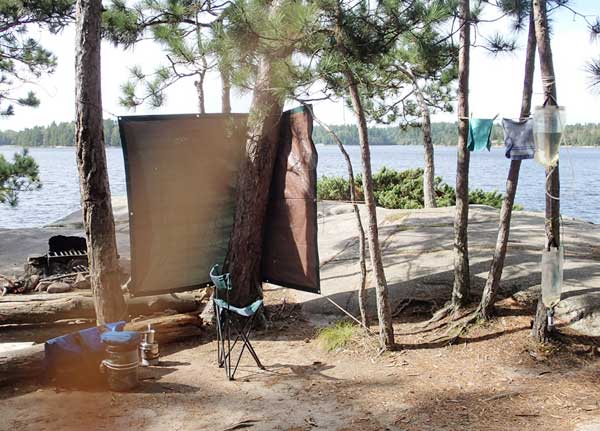
Something encountered on a walk along the
shoreline:
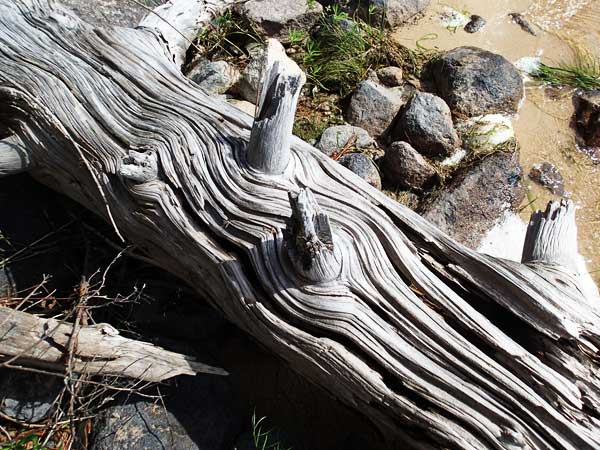
Tonight's forecast includes a 60% chance of
light rain after midnight, so I set up the tarp and move the tent under
it so I can keep the door open.
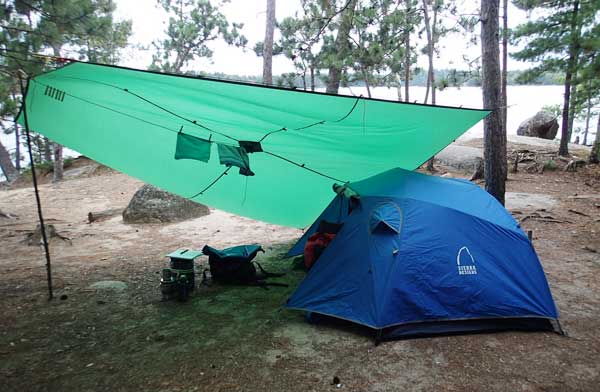
And I set up the latrine tarp, just in case.
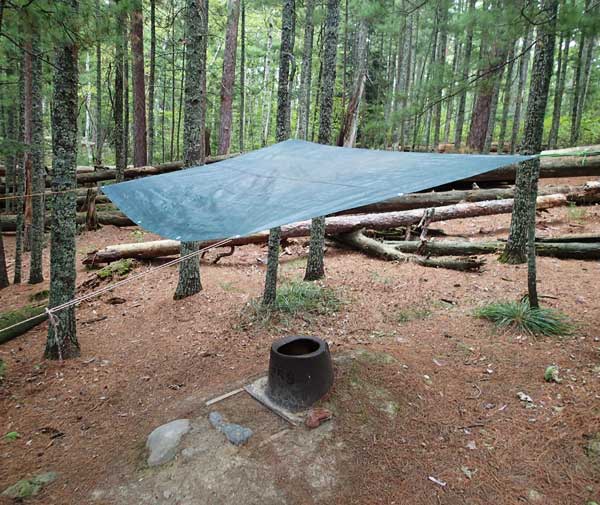
It's Saturday night at 7:00 and raining, and I'm enjoying
Chambord with dark chocolate, tonight's dessert. The tarp is billowing
in the wind and I can't imagine anywhere I'd rather be. Remembering
a few severe storms I've been through, I wonder what it would take
to make me want to leave here.
- Losing my food? Yes.
- Losing the tent? No. I can use the two tarps for shelter.
- Medical emergency? Appendicitis - yes, provided I could move. Sprained
ankle - no, I have enough food to last the week it would take
before I could walk on it.
- Broken boat? Yes, provided I couldn't fix it and could get help.
Shortly after this little meditation I hear two loud
noises back in the woods. They sound like gunshots but I suspect they're
from a falling tree. A few minutes later there are more sounds,
like rapid-fire, muffled explosions. Did a tree come down the rest
of the way? Mindful breathing helps me keep from getting
rattled.
What does get to me is noticing a few wet spots on my
tent floor. The ground cloth (the "outie") obviously isn't keeping
water from seeping between it and the tent, and the floor itself obviously
isn't waterproof. The plastic "innie" is folded up in
the tent's stuff sack so I get it out and work it underneath the stuff
in the tent. Good thing, too, because in the morning there's a fair
amount of water under it.
It rains cats, dogs, and pitchforks, and although nothing
gets in the tent I close the door. Somehow that makes me feel more
secure. Funny how that works.
I'm awake at 5:30 to decide whether to stay another day
or pack up and move on. The forecast is for a northerly headwind so
I go back to bed and get up a few hours later. The day gradually clears,
and what starts as a light breeze quickly builds to 10-15+ mph. I'm
glad not to be paddling into it.
Last night I forgot to put the leftover trail mix into
the food pack before stashing it, so I hung it, more concerned with
chipmunks than bears. I'm a little surprised to see it's still there.
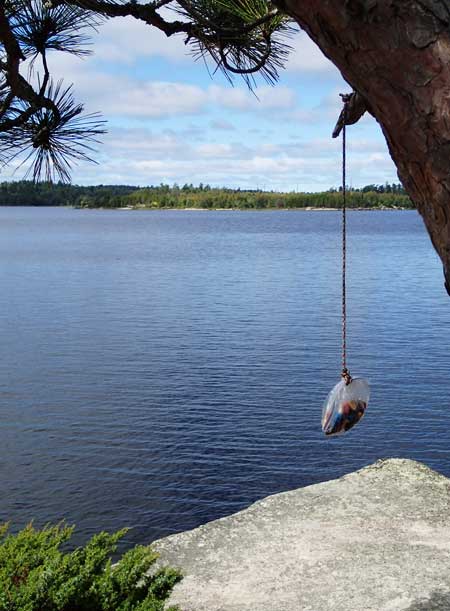
It's a nice, slow day that I spend reading, meditating,
doing yoga (good for the sore back), and feeling very blessed. It warms
my heart to send my dear friend Becca good wishes on her 20th
birthday.
There are a lot of down trees at this site. Remembering
last night's storm - and the tree-falling noises - I take note of the
direction they're facing. Most of them seem to have fallen to the east,
though some point south. I note that my tent is west of any big trees.
That thought isn't quite as comforting as I'd hoped.
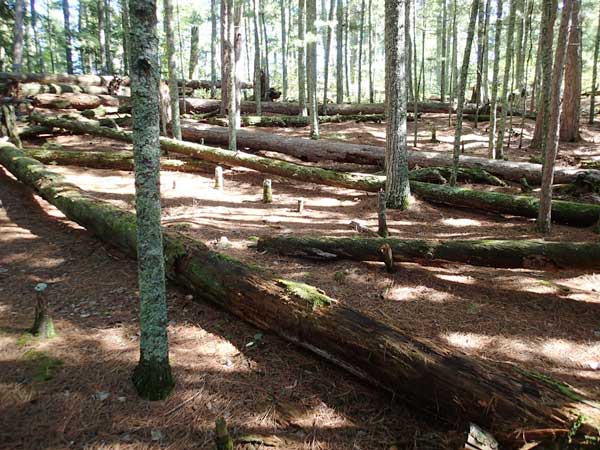
It's a sunny day.
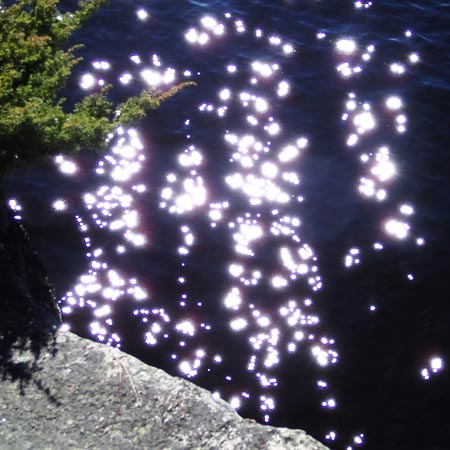
Two shots from the sand beach, first looking south and
then north. The rock wall is 10-15 feet high.
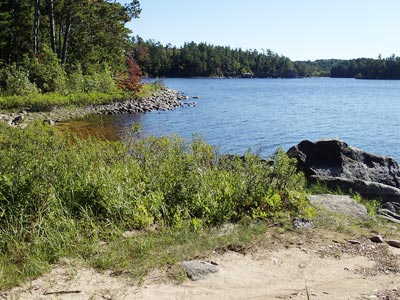 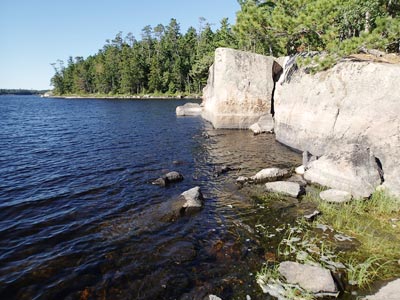
Someone left a mousetrap behind. A moustrap!? To catch
what - chipmunks? Is that sick or what?
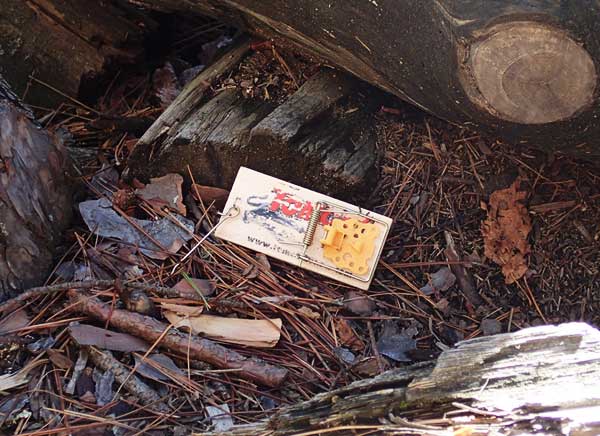
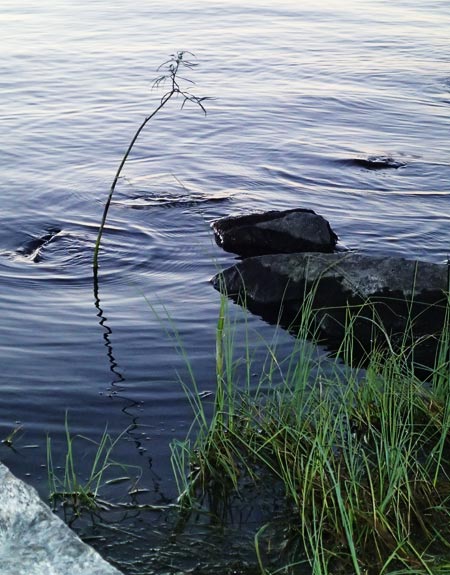
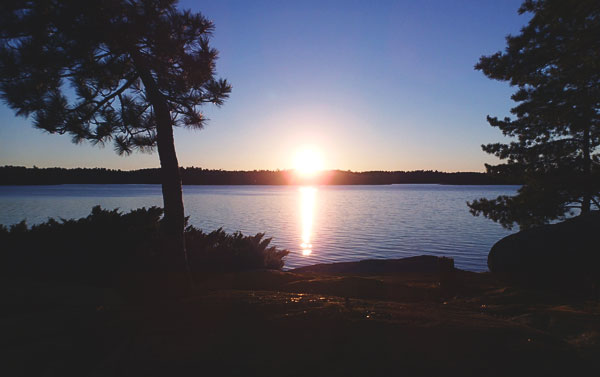
Tonight's forecast is clear with temps around 30. I'm
fine with just the 25-degree bag. None of the nights so far has been
as cold as anticipated, and I wonder if inland lakes provide the same
benefit as the Great Lakes, keeping the area warmer in the fall. Spring
nights seem to be closer to the forecast temps.
Previous
Days 5-7: Mon.-Wed.,
Sept. 16-18 - Back to the Beginning
Back to top
|
